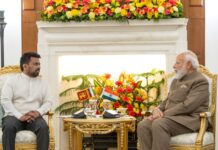Anna Bjerde, Managing Director for Operations at the World Bank, has urged the Sri Lankan government to continue with its reforms in order to achieve recovery and long-term growth.
She also emphasised the World Bank’s ongoing commitment to investing in people, enhancing human capital, and generating jobs as she wrapped off her four-day tour to Sri Lanka today.
Bjerde met with a number of important people during the tour, including cabinet members, opposition party representatives, members of civil society, business leaders, development partners, and recipients of World Bank projects. Ranil Wickremesinghe is the president and minister of finance of Sri Lanka.
She took part in a roundtable discussion with prominent ministers, representatives of the business sector, and development partners, including those who are a part of the MDB+ platform, which consists of bilateral and multilateral development partners. Member institutions can plan their interactions with Sri Lanka through this website. The roundtable’s main topics of discussion included Sri Lanka’s advancements in structural reforms, attracting private investment for development, fostering the growth of human capital, and fostering regional collaboration.
“It is critical to continue with sensible and timely reforms to stabilise the economy while fostering economic growth that can attract investment, create jobs, protect the poor and most vulnerable, and build resilience to future crises,” the statement reads. “Sri Lanka is recovering from a series of unprecedented shocks with devastating impacts. However, bolstering social cohesion, civic engagement, and governance are as crucial and necessary for inclusive growth, according to Bjerde.
During her visit, she saw initiatives in the Northern and North Central Provinces backed by the World Bank that dealt with health, agriculture, climate change, private sector development, and financial inclusion for women.
“I learned about the difficulties faced by Sri Lankans throughout my tour. Professionals with advanced degrees are fleeing the nation, farmers are finding it difficult to adapt to a changing environment, and businesses are facing obstacles due to a lack of funding and credit availability. However, I also saw enormous prospects to advance entrepreneurship, competitiveness, regional connections, climate-smart agriculture, and the use of renewable energy,” Bjerde continued. “By facilitating farmers’ access to markets, enhancing healthcare access, encouraging innovation, pursuing transformation through infrastructure investments, and generating high-quality jobs for women and young people, the World Bank will persist in its support of Sri Lanka during its recovery journey.”
For over 70 years, Sri Lanka has benefited from the financial and intellectual assistance of the World Bank as a partner.
Repurposing funds from the existing portfolio, the World Bank moved quickly at the start of the economic crisis in May 2022 to help shield Sri Lankans, especially the poor and vulnerable, from the worst effects. Furthermore, among the first organisations to respond to the crisis was the World Bank, which together with the Asian Development Bank and the Asian Infrastructure Investment Bank established a coordination platform to coordinate emergency assistance in order to support the continuation of essential goods and services.



